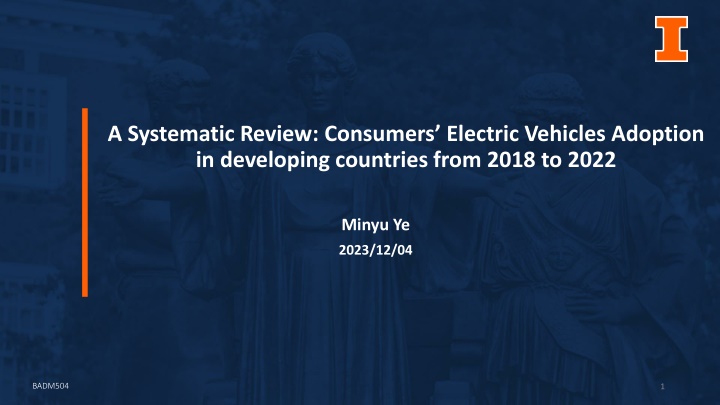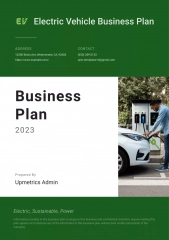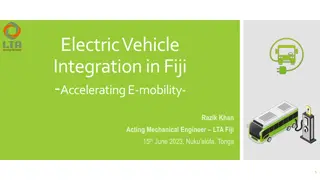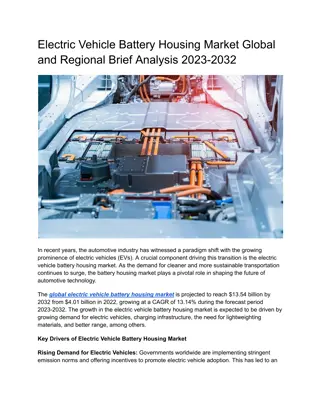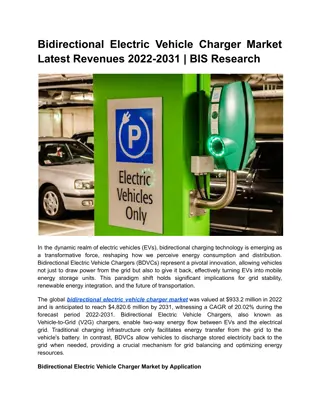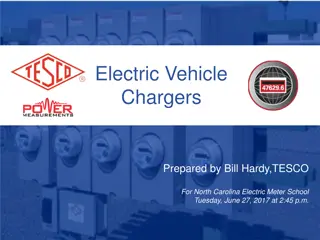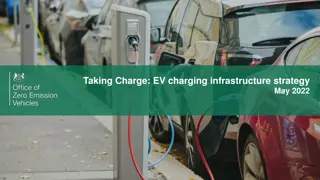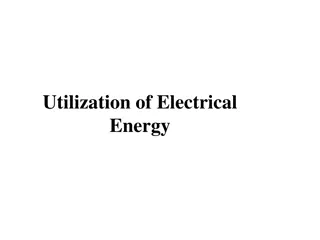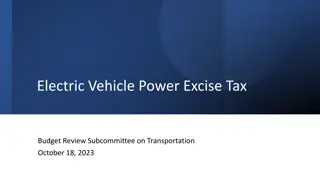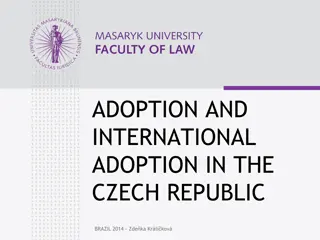Factors Influencing Consumers' Electric Vehicle Adoption in Developing Countries (2018-2022)
This systematic review explores the factors influencing the adoption of electric vehicles (EVs) in developing countries from 2018 to 2022. The study delves into the complex interplay of economic, social, technological, and environmental factors shaping consumers' decisions regarding EV adoption. By examining a wide range of journals, the research sheds light on the dynamics surrounding EV adoption during a period of rapid technological advancements and increasing environmental awareness.
Download Presentation

Please find below an Image/Link to download the presentation.
The content on the website is provided AS IS for your information and personal use only. It may not be sold, licensed, or shared on other websites without obtaining consent from the author.If you encounter any issues during the download, it is possible that the publisher has removed the file from their server.
You are allowed to download the files provided on this website for personal or commercial use, subject to the condition that they are used lawfully. All files are the property of their respective owners.
The content on the website is provided AS IS for your information and personal use only. It may not be sold, licensed, or shared on other websites without obtaining consent from the author.
E N D
Presentation Transcript
A Systematic Review: Consumers Electric Vehicles Adoption in developing countries from 2018 to 2022 Minyu Ye 2023/12/04 BADM504 1
Introduction Introduction Source: https://www.statista.com/chart/28211/electric-vehicles-revenue-projections/ https://theicct.org/publication/global-ev-update-2021-jun22/ BADM504 2
Research Question Research Question The adoption of electric vehicles is a complex process influenced by a multitude of interconnected factors that span economic, social, technological, and environmental dimensions. Understanding the dynamics of EV adoption in developing countries is particularly critical, given the unique challenges and opportunities most nations face. The years 2018 to 2022 represent a period of rapid advancements in electric vehicle technology and a growing awareness of environmental issues. What are the factors that influence consumers electric vehicle adoption in developing countries from 2018 to 2022? BADM504 3
Method: Search Strategy Fig. 1 Flow of references processed in the systematic review BADM504 4
Study inclusion and data analysis Study inclusion and data analysis Table 1. Summary of Journal Journal Count of Article SUSTAINABILITY 11 ENERGIES, 2 TRANSPORTATION RESEARCH PART A-POLICY AND PRACTICE 4 JOURNAL OF CLEANER PRODUCTION 3 TRANSPORTATION RESEARCH PART D-TRANSPORT AND ENVIRONMENT, 2 ENERGIES 2 TRANSPORTATION RESEARCH PART D-TRANSPORT AND ENVIRONMENT 2 INTERNATIONAL JOURNAL OF SUSTAINABLE TRANSPORTATION 1 CASE STUDIES ON TRANSPORT POLICY 1 JOURNAL OF DECISION SYSTEMS 1 JOURNAL OF CLEANER PRODUCTION, 3 ENERGY POLICY 1 SUSTAINABILITY, 11 TRANSPORTATION IN DEVELOPING ECONOMIES 1 ENVIRONMENTAL SCIENCE AND POLLUTION RESEARCH 1 CURRENT PSYCHOLOGY 1 EUROPEAN JOURNAL OF TRANSPORT AND INFRASTRUCTURE RESEARCH 1 RESEARCH IN TRANSPORTATION BUSINESS AND MANAGEMENT 1 TRANSPORTATION RESEARCH PART A-POLICY AND PRACTICE, 4 TRANSPORTATION LETTERS-THE INTERNATIONAL JOURNAL OF TRANSPORTATION RESEARCH 1 TRANSPORT POLICY 1 COGENT BUSINESS & MANAGEMENT 1 Fig. 2 Top 5 Journals COGENT ENGINEERING 1 BUSINESS STRATEGY AND DEVELOPMENT 1 INDUSTRIAL MANAGEMENT & DATA SYSTEMS 1 WORLD ELECTRIC VEHICLE JOURNAL 1 INNOVATIVE MARKETING 1 INTERNATIONAL JOURNAL OF NONPROFIT AND VOLUNTARY SECTOR MARKETING 1 5 Total 40
Study inclusion and data analysis Study inclusion and data analysis 2018, 5, 12% 2022, 6, 15% 2019, 9, 22% 2021, 9, 23% 2020, 11, 28% Fig. 3 Research year of articles in the systematic review BADM504 6
Nature of the theory, methodology and factors Nature of the theory, methodology and factors Table 3. Summary of Methodology Methodology Table 2. Summary of Theory Correlation analysis Regression analysis Theory A dual-factor model Theory of Planned Behavior (TPB) A multivariate statistical procedure Social network theory Semi-structured interviews Innovation Diffusion Theory (IDT) Extended Technology Acceptance Model (TAM) Binary probit and ordered probit model Environmental concern theory Configurational perspective and the fsQCA (fuzzy-set qualitative comparative analysis) approach Decomposed Theory of Planned Behavior (DTPB) Factor analysis Theory of Exploratory Factor Analysis (EFA) Machine learning techniques Theory of Necessary Conditions Analysis (NCA) Maximum Likelihood Estimation method Status Quo Bias(SQB) theory Path analysis Multinomial Logit (MNL) models and Moran s I for spatial analysis Value-belief-norm (VBN) theory Partial least squares (PLS) method Extended Theory of Planned Behavior (ETPB) Partial Least Squares Structural Equation Modeling (PLS-SEM) Norm Activation Model (NAM) Principal Component Analysis (PCA) Theory of Reasoned Action (TRA) Structural equation model (SEM) Unified Theory of Acceptance and Use of Technology (UTAUT) Confirmatory factor analysis (CFA) BADM504 7
Nature of the theory, methodology and factors Nature of the theory, methodology and factors BahrainIndonesia Vietnam Brazil Table 4. Geographic distribution of research Turkey Poland Country/City Count of Article Ghana China 20 India 10 Malaysia Thailand 1 Pakistan Pakistan 1 Thailand Malaysia 1 China Ghana 1 Poland 1 Turkey 1 Brazil 1 Vietnam 1 Bahrain 1 India Indonesia 1 Total 40 Fig. 4 Country/City covered BADM504 8
Result: Systematic Review Result: Systematic Review Category Details 1. Perceived value: This factor refers to the perceived benefits and advantages of using electric vehicles, such as cost savings, environmental friendliness, and technological advancements. 2. Attitude: The attitude of consumers towards electric vehicles, including their personal preferences, beliefs, and opinions about EVs, can influence their intention to adopt them. 3. Ascription of responsibility: This factor relates to consumers perception of their responsibility towards the environment and their willingness to contribute to sustainability by adopting electric vehicles. 4. Subjective norms: Subjective norms refer to the influence of social factors, such as family, friends, and society, on consumers intention to adopt electric vehicles. It includes the perceived social pressure and approval/disapproval from others. Behavior 5. Personal norms: Personal norms are the internalized beliefs and values of individuals regarding environmental responsibility and sustainability. These norms can influence consumers intention to adopt electric vehicles. 6. Perceived consumer effectiveness: This factor relates to consumers belief in their ability to make a positive impact on the environment by adopting electric vehicles. It includes their confidence in using EVs and their perception of their own effectiveness in reducing carbon emissions. 7. Awareness of consequences: Consumers awareness of the environmental consequences of using conventional vehicles versus electric vehicles can influence their intention to adopt EVs. This includes knowledge about the environmental benefits and impacts of EVs. BADM504 9
Result: Systematic Review Result: Systematic Review Category Details 1. Price: The price of EVs compared to traditional cars is a significant factor influencing adoption intentions. 2. Government Policies: Incentives such as subsidies, tax benefits, and infrastructure development Economics initiatives can positively impact the adoption of EVs. 3. Financial motivations: Factors such as purchase price, fuel cost, maintenance cost, and overall cost are important determinants of people s preference for EVs. 1. Availability of charging facility: The accessibility and availability of charging infrastructure for EVs. Infrastructure BADM504 10
Result: Systematic Review Result: Systematic Review Category Details 1. Vehicle performance barriers: Consumers are concerned about the maximum range offered by EVs in a single charge and the lengthy charging times. 1) Range anxiety, or the fear of running out of charge during long journeys, is a significant factor. 2) The lengthy charging time and the inconvenience of recharging facilities at home and along highways also contribute to the performance Technical features barriers. 2. Technological factors: These include driving range, charging time, noise, acceleration, CO2 emissions, functionality, reliability, safety, and image of EVs. 1. Societal influence: The influence of peers, family, and society plays a role in consumers consideration of the environment when purchasing an EV. Social responsibility and the opinions of people close to them influence their decision. 2. Age: Younger age groups are more interested in adopting EVs compared to older age groups. 3. Mode of transportation: Personal car users were found to have lower intentions to adopt EVs compared to users of other modes of transportation, Individual features such as public transport and pedestrians. 4. Socio-demographic factors: Socio-demographic factors such as income and employment status were found to influence EV preferences. For example, part-time workers and high-income individuals were more likely to support BEVs, while individuals living in apartments were more likely to support FCEVs. BADM504 11
Conclusion Conclusion This review provided an examination of the factors influencing consumers electric vehicle (EV) adoption in developing countries from 2018 to 2022. The intricate interplay of behavioral, economic, infrastructural, technical, and individual features shapes the decision- making process of consumers in adopting electric vehicles. Policymakers, industry stakeholders, and researchers can collaborate to formulate comprehensive strategies that address the nuanced interplay of different factors. BADM504 12
References References Asadi, S., Nilashi, M., Samad, S., Abdullah, R., Mahmoud, M., Alkinani, M. H., & Yadegaridehkordi, E. (2021). Factors impacting consumers intention toward adoption of electric vehicles in Malaysia. Journal of Cleaner Production, 282, 124474. https://doi.org/10.1016/j.jclepro.2020.124474 Ackaah, W., Kanton, A. T., & Osei, K. K. (2021). Factors influencing consumers intentions to purchase electric vehicles in Ghana. Transportation Letters, 14(9), 1031 1042. https://doi.org/10.1080/19427867.2021.1990828 Krishnan, V. V., & Koshy, B. I. (2021). Evaluating the factors influencing purchase intention of electric vehicles in households owning conventional vehicles. Case Studies on Transport Policy, 9(3), 1122 1129. https://doi.org/10.1016/j.cstp.2021.05.013 Dong, X., Zhang, B., Wang, B., & Wang, Z. (2020). Urban households purchase intentions for pure electric vehicles under subsidy contexts in China: Do cost factors matter? Transportation Research Part A: Policy and Practice, 135, 183 197. https://doi.org/10.1016/j.tra.2020.03.012 Jayasingh, S., Girija, T., & Arunkumar, S. (2021). Factors influencing consumers purchase intention towards electric two-wheelers. Sustainability, 13(22), 12851. https://doi.org/10.3390/su132212851 Huang, X., & Ge, J. (2019). Electric Vehicle Development in Beijing: An analysis of consumer purchase intention. Journal of Cleaner Production, 216, 361 372. https://doi.org/10.1016/j.jclepro.2019.01.231 Zhang, J., Xu, S., He, Z., Li, C., & Meng, X. (2022). Factors influencing adoption intention for electric vehicles under a subsidy deduction: From different city-level perspectives. Sustainability, 14(10), 5777. https://doi.org/10.3390/su14105777 Joshi, N., Malhotra, M., & Singh, J. (2022). Assessing adoption intention of electric vehicles in India: The mediating role of government policies. European Journal of Transport and Infrastructure Research, 22(1). https://doi.org/10.18757/ejtir.2022.22.1.5973 Jiang, Q., Wei, W., Guan, X., & Yang, D. (2021). What increases consumers purchase intention of battery electric vehicles from Chinese electric vehicle start-ups? taking Nio as an example. World Electric Vehicle Journal, 12(2), 71. https://doi.org/10.3390/wevj12020071 Ye, F., Kang, W., Li, L., & Wang, Z. (2021). Why do consumers choose to buy electric vehicles? A paired data analysis of purchase intention configurations. Transportation Research Part A: Policy and Practice, 147, 14 27. https://doi.org/10.1016/j.tra.2021.02.014 He, Z., Zhou, Y., Wang, J., Shen, W., Li, W., & Lu, W. (2022). Influence of emotion on purchase intention of electric vehicles: A Comparative Study of consumers with different income levels. Current Psychology, 42(25), 21704 21719. https://doi.org/10.1007/s12144-022-03253-1 Wei, W., Cao, M., Jiang, Q., Ou, S.-J., & Zou, H. (2020). What influences Chinese consumers adoption of battery electric vehicles? A preliminary study based on factor analysis. Energies, 13(5), 1057. https://doi.org/10.3390/en13051057 Gunawan, I., Redi, A. A., Santosa, A. A., Maghfiroh, M. F., Pandyaswargo, A. H., & Kurniawan, A. C. (2022). Determinants of customer intentions to use electric vehicle in Indonesia: An integrated model analysis. Sustainability, 14(4), 1972. https://doi.org/10.3390/su14041972 BADM504 13
References References Wang, X.-W., Cao, Y.-M., & Zhang, N. (2021). The influences of incentive policy perceptions and consumer social attributes on Battery Electric Vehicle Purchase Intentions. Energy Policy, 151, 112163. https://doi.org/10.1016/j.enpol.2021.112163 Lee, J., Baig, F., Talpur, M. A., & Shaikh, S. (2021). Public intentions to purchase electric vehicles in Pakistan. Sustainability, 13(10), 5523. https://doi.org/10.3390/su13105523 Ye in, T., & Ikram, M. (2022). Analysis of consumers Electric Vehicle Purchase Intentions: An expansion of the theory of planned behavior. Sustainability, 14(19), 12091. https://doi.org/10.3390/su141912091 Liao, Y. (2021). Intention of consumers to adopt electric vehicle in the post-subsidy era: Evidence from China. International Journal of Sustainable Transportation, 16(7), 647 659. https://doi.org/10.1080/15568318.2021.1918297 Sun, K. K., He, S. Y., & Th gersen, J. (2022). The purchase intention of electric vehicles in Hong Kong, a high-density Asian context, and main differences from a Nordic context. Transport Policy, 128, 98 112. https://doi.org/10.1016/j.tranpol.2022.09.009 K V, S., Michael, L. K., Hungund, S. S., & Fernandes, M. (2022). Factors influencing adoption of electric vehicles - a case in India. Cogent Engineering, 9(1). https://doi.org/10.1080/23311916.2022.2085375 Yang, C., Tu, J.-C., & Jiang, Q. (2020). The influential factors of consumers sustainable consumption: A case on electric vehicles in China. Sustainability, 12(8), 3496. https://doi.org/10.3390/su12083496 Hoang, T. T., Pham, T. H., & Vu, T. M. (2022). Examining customer purchase decision towards battery electric vehicles in Vietnam market: A combination of self-interested and pro-environmental approach. Cogent Business & Management, 9(1). https://doi.org/10.1080/23311975.2022.2141671 Dutta, B., & Hwang, H.-G. (2021). Consumers purchase intentions of Green Electric Vehicles: The influence of consumers technological and environmental considerations. Sustainability, 13(21), 12025. https://doi.org/10.3390/su132112025 Zheng, S., Liu, H., Guan, W., Yang, Y., Li, J., Fahad, S., & Li, B. (2022). Identifying intention-based factors influencing consumers willingness to pay for electric vehicles: A sustainable consumption paradigm. Sustainability, 14(24), 16831. https://doi.org/10.3390/su142416831 Sovacool, B. K., Abrahamse, W., Zhang, L., & Ren, J. (2019). Pleasure or profit? surveying the purchasing intentions of potential electric vehicle adopters in China. Transportation Research Part A: Policy and Practice, 124, 69 81. https://doi.org/10.1016/j.tra.2019.03.002 Manutworakit, P., & Choocharukul, K. (2022). Factors influencing battery electric vehicle adoption in Thailand expanding the unified theory of acceptance and use of technology s variables. Sustainability, 14(14), 8482. https://doi.org/10.3390/su14148482 Buranelli de Oliveira, M., Moretti Ribeiro da Silva, H., Jugend, D., De Camargo Fiorini, P., & Paro, C. E. (2022). Factors influencing the intention to use electric cars in Brazil. Transportation Research Part A: Policy and Practice, 155, 418 433. https://doi.org/10.1016/j.tra.2021.11.018 Zhuge, C., & Shao, C. (2019). Investigating the factors influencing the uptake of electric vehicles in Beijing, China: Statistical and spatial perspectives. Journal of Cleaner Production, 213, 199 216. https://doi.org/10.1016/j.jclepro.2018.12.099 BADM504 14
References References Tu, J.-C., & Yang, C. (2019). Key factors influencing consumers purchase of Electric Vehicles. Sustainability, 11(14), 3863. https://doi.org/10.3390/su11143863 Huang, X., Lin, Y., Lim, M. K., Tseng, M.-L., & Zhou, F. (2021). The influence of knowledge management on adoption intention of electric vehicles: Perspective on Technological Knowledge. Industrial Management & Data Systems, 121(7), 1481 1495. https://doi.org/10.1108/imds-07-2020-0411 Verma, M., Verma, A., & Khan, M. (2020). Factors influencing the adoption of electric vehicles in Bengaluru. Transportation in Developing Economies, 6(2). https://doi.org/10.1007/s40890-020-0100-x Jain, N. K., Bhaskar, K., & Jain, S. (2022). What drives adoption intention of electric vehicles in India? an integrated utaut model with environmental concerns, perceived risk and government support. Research in Transportation Business & Management, 42, 100730. https://doi.org/10.1016/j.rtbm.2021.100730 Sobiech-Grabka, K., Stankowska, A., & Jerzak, K. (2022). Determinants of electric cars purchase intention in Poland: Personal attitudes v. economic arguments. Energies, 15(9), 3078. https://doi.org/10.3390/en15093078 Li, L., Wang, Z., & Wang, Q. (2020). Do policy mix characteristics matter for electric vehicle adoption? A survey-based exploration. Transportation Research Part D: Transport and Environment, 87, 102488. https://doi.org/10.1016/j.trd.2020.102488 Chaudhary, P., & Kate, N. (2023). The coalescence effect: Understanding the impact of customer value proposition, perceived benefits and climate change sensitivities on electric vehicle adoption in India. Business Strategy & Development. https://doi.org/10.1002/bsd2.282 Chhikara, R., Garg, R., Chhabra, S., Karnatak, U., & Agrawal, G. (2021). Factors affecting adoption of electric vehicles in India: An exploratory study. Transportation Research Part D: Transport and Environment, 100, 103084. https://doi.org/10.1016/j.trd.2021.103084 Ali, I., & Naushad, M. (2022). Insights on electric vehicle adoption: Does attitude play a mediating role? Innovative Marketing, 18(1), 104 116. https://doi.org/10.21511/im.18(1).2022.09 Shankar, A., & Kumari, P. (2019). Exploring the enablers and inhibitors of electric vehicle adoption intention from sellers perspective in India: A view of the dual factor model. International Journal of Nonprofit and Voluntary Sector Marketing, 24(4). https://doi.org/10.1002/nvsm.1662 Liu, R., Ding, Z., Jiang, X., Sun, J., Jiang, Y., & Qiang, W. (2020). How does experience impact the adoption willingness of battery electric vehicles? the role of psychological factors. Environmental Science and Pollution Research, 27(20), 25230 25247. https://doi.org/10.1007/s11356-020-08834-w Shareeda, A., Al-Hashimi, M., & Hamdan, A. (2021). Smart Cities and Electric Vehicles Adoption in Bahrain. Journal of Decision Systems, 30(2 3), 321 343. https://doi.org/10.1080/12460125.2021.1911024 Xia, Z., Wu, D., & Zhang, L. (2022). Economic, functional, and social factors influencing electric vehicles adoption: An empirical study based on the diffusion of innovation theory. Sustainability, 14(10), 6283. https://doi.org/10.3390/su14106283 BADM504 15
Thank you! Thank you!
